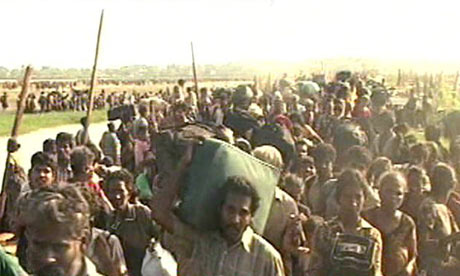
A video image shows civilians fleeing a strip of land held by Tamil rebels during the civil war. Photograph: Reuters/Reuters
Sri Lanka today objected to attempts by the US to question the chief of its army over allegations of war crimes during the final stages of the conflict with the Tamil Tigers.
US immigration authorities told General Sarath Fonseka, who is currently visiting his daughters in Oklahoma, that they would like to interview him before renewing his green card.
The Sri Lankan government said it was "worried" about the questions he might have to face because the US state department had made "allegations of crimes committed by the Sri Lankan armed forces".
Officials in Colombo are concerned that the US could also seek to ask the army chief about the involvement of the defence secretary, Gotabaya Rajapaksa – the brother of the Sri Lankan president and a US citizen – in the war.
The Sri Lankan embassy in Washington has retained lawyers from Patton Boggs, a leading law firm, to make the case that Sri Lanka could resist US attempts to question Fonseka over the defence secretary's conduct.
Fonseka and Rajapaksa are seen as the brains behind the government's bloody victory in May, which saw the Tamil Tiger leadership wiped out on the Indian Ocean island's north-eastern beaches.
Tamil groups have long urged the US to prosecute both the general and the defence secretary for what they describe as "genocide".
Bruce Fein, a lawyer for the US-based group Tamils Against Genocide, has argued that the political justification for a genocide investigation was strengthened because the "United States has been vocal with Serbia, Bosnia and other nations about policing and punishing their own citizens or residents for genocide".
There have been persistent allegations of war crimes committed during the final months of the 25-year Sri Lankan civil war.
Last month, the US state department's leading war crimes official, Stephen Rapp, called on Sri Lanka to conduct a "genuine" investigation into allegations of war crimes by both government troops and the Tigers.
Rapp's statement came as the state department released a 68-page report, based on US embassy findings, satellite imagery and aid agencies accounts, that painted a bleak picture of civilian life in a war zone under constant bombardment and where the death toll was rising. According to the UN and human rights groups, between 7,000 and 20,000 civilians were killed in the north-east between January and May.
The report blamed both the government and the Tigers. It said rebels had shot people trying to flee from their territory, forcibly recruited child soldiers and used suicide bombers.
But it also alleged that government forces shelled civilian populations, hospitals and schools in rebel-controlled territory, often in areas that had been described by the authorities as no-fire zones.
The Democratic senator Patrick Leahy, who wrote the legislation requiring the report, said it "eliminates any reasonable doubt that serious violations of the laws of war were committed by both the LTTE [Tamil Tiger] rebels and Sri Lankan government forces".
Sri Lanka dismissed the document as "unsubstantiated and devoid of corroborative evidence" .
Since then, Colombo has promised to investigate the final stages of the war, but many observers have raised doubts over its commitment to investigating itself.


 Another Sell-out, TNA MP, Sivanathan Kisor- is making.
Another Sell-out, TNA MP, Sivanathan Kisor- is making.
